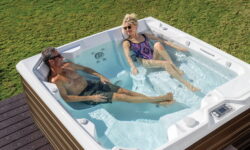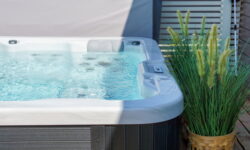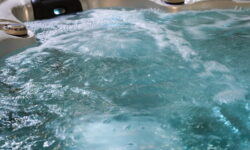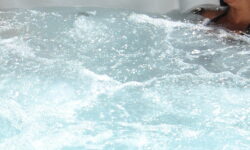You’ve enjoyed a soak in your hot tub, but now it’s time to drain it. You’re eyeing your lawn, considering the easiest option. But hold on! Is hot tub water bad for your grass?
Yes, hot tub water can be bad for grass. The chemicals typically found in hot tub water, like chlorine, bromine, or other sanitizing agents, can damage or kill your lawn if the concentration is too high. Additionally, if the water is extremely hot, it can also cause harm. However, if the water has been dechlorinated and is allowed to cool before being used to water grass, it might not cause damage.
Let’s explore the impact of the chemicals and temperature on your lawn’s health, and discuss safe methods for draining. We’ll also suggest alternative uses for that old water. Let’s ensure you’re caring for your yard as much as you do for your hot tub.
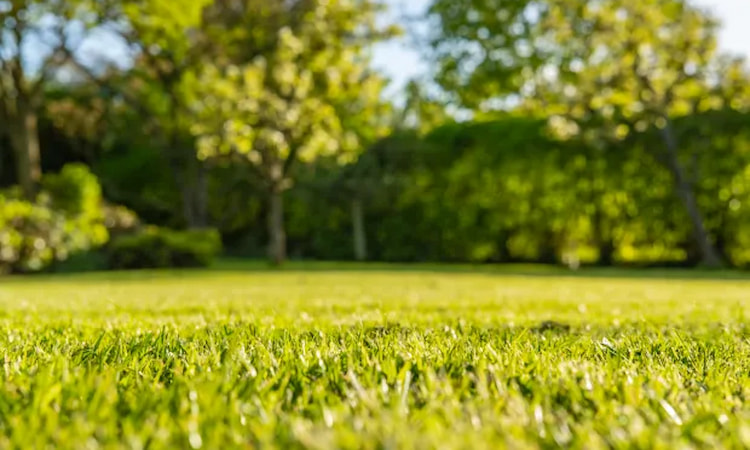
Quick Navigation
Understanding the Composition of Hot Tub Water
You’ll often find that understanding the composition of hot tub water is key to knowing its impact on your grass. Spa water benefits aren’t just for your skin and relaxation, they also play a role in your lawn’s health.
Hot tub or spa water contains various chemicals, primarily chlorine or bromine, which are used to kill bacteria and other harmful organisms. These chemicals can be beneficial to your grass, but only in the right quantities. If the concentration is too high, it can cause damage.
Furthermore, the warm temperature of the spa water can encourage the growth of algae, which can be harmful to your grass. However, the chemicals present also aid in algae growth prevention. When used correctly, these chemicals can prevent the growth of algae, keeping your grass healthy and vibrant.
In contrast, the minerals present in the spa water, such as magnesium and calcium, can nourish your grass, promoting its growth. However, like the chemicals, these minerals can cause harm if their levels are too high.
Knowing the composition of your spa water and managing it correctly is crucial for the overall health of your grass.
The Effects of Chlorine and Other Chemicals on Grass
In your quest to maintain a healthy lawn, you’re likely to encounter chlorine and other chemicals, but how they affect your grass might surprise you.
While chlorine is typically harmful to most plant life, some grass types demonstrate remarkable chlorine resistance. However, the extent of this resistance varies and it’s important to understand that overexposure can still be detrimental.
Here’s a closer look at how these substances can impact your lawn:
- Chlorine’s Impact: Chlorine can alter the soil pH, inhibiting your grass’s ability to absorb essential nutrients. Over time, this can lead to yellowing, wilting, and even death of the grass.
- Grass-friendly Sanitizers: Not all sanitizers are harmful to your lawn. Certain options like bromine and non-chlorine shocks can be less damaging.
- Chlorine Resistance in Grass: Some grass types have developed a resistance to chlorine. However, the level of resistance depends on the grass type and the amount of exposure.
The Impact of Hot Tub Water Temperature on Lawn Health
Despite the chemicals, don’t forget about the potential impact of the temperature of your hot tub water on your lawn health. High-temperature water can cause considerable soil impact, disrupting the natural balance of your lawn.
The heat can kill beneficial microorganisms in the soil that are essential for healthy grass growth. It can also change the soil structure, making it hard and compact. This prevents grassroots from spreading and absorbing nutrients effectively.
Moreover, the heat from the hot tub water speeds up the evaporation process. Rapid evaporation effects can cause your lawn to lose water faster than it can absorb, leading to dehydration of the grass. The grass becomes stressed and starts wilting under prolonged exposure to such conditions.
It’s crucial to note that different types of grass have different heat tolerance levels, so some lawns may be more prone to damage than others.
Safe Methods of Draining Your Hot Tub
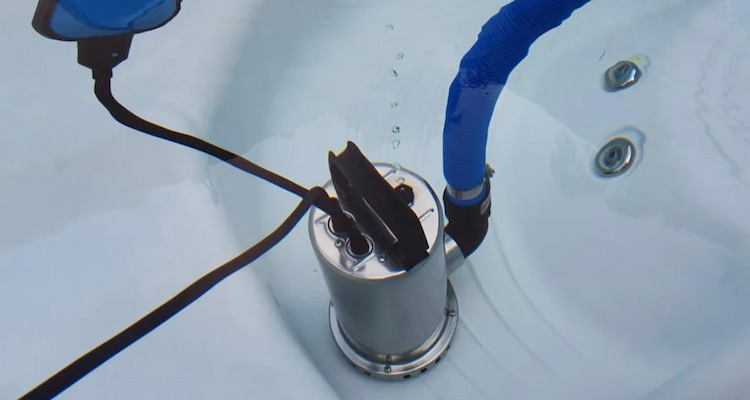
Before we dive into the details, it’s essential to know that there are several safe methods for draining your hot tub, and each one can help prevent damage to your grass. Understanding these drainage techniques and incorporating them into your regular tub maintenance routine can keep your lawn healthy while allowing you to enjoy your hot tub.
To make this more enjoyable and relatable, here are some of the most effective methods:
Direct Drainage
- You can use a hose to direct the water to a safe drainage area.
- Avoid draining directly onto grass or plants.
- Consider local regulations regarding water disposal.
Use of a Pump
- A submersible pump can speed up the process.
- Ensure the drained water doesn’t flood your yard or neighbors’.
Eco-friendly Chemical Treatment
- Treat hot tub water with eco-friendly chemicals before draining.
- This helps neutralize harmful substances in the water.
Related Read: How Many Gallons of Water in a Hot Tub?
Alternative Uses for Old Hot Tub Water
You’ve got a tub full of old water, and you’re not sure what to do with it, but don’t panic, there are plenty of alternative uses for that old hot tub water. The recycling possibilities are endless and many of them contribute to water conservation, a crucial factor in today’s world.
Consider using the water to irrigate your plants. However, it’s important to let the water sit for a few days to allow chemicals like chlorine to evaporate before using it on plants. This way, you’re not only reusing water but also saving on your water bill.
Another option is to use it for cleaning purposes. Old hot tub water can be used to scrub your patio, clean your car, or even wash your driveway. Again, ensure the water has sat long enough to evaporate any harmful chemicals.
Lastly, if you’re a fan of DIY projects, consider using the old water to make a small pond in your backyard. It’s an effective way to recycle and conserve water.
Frequently Asked Questions
When considering grass alternatives resistant to hot tub water damage, Bermuda grass is a strong contender. It’s durable and can handle the heat. Still, careful tub placement is essential to minimize potential harm.
Yes, hot tub water can negatively impact the soil under your grass. High water temperatures can alter soil composition, while chemicals can cause grass discoloration. It’s best to drain your tub away from your lawn.
Yes, the frequency of hot tub water exposure impacts grass health. Water temperature effects can scorch it, and continuous exposure may inhibit recovery. You’ll need effective grass recovery methods to restore health.
Yes, you can use a water quality assessment to check for harmful chemicals. If damage persists, consider grass alternatives that are more resilient to these conditions. It’s about finding the right solution for your yard.
Yes, the chemicals in hot tub water can attract pests and cause lawn issues. Pests’ attraction mechanisms are triggered by these substances, and your lawn may show chemical contamination symptoms like discoloration or wilting.
Conclusion
In conclusion, hot tub water can be harmful to your grass due to its chemical composition and high temperature. To protect your lawn, it’s crucial to follow safe draining methods or repurpose the water for other uses.
Remember, your hot tub’s health shouldn’t come at the expense of your lawn. Stay informed and make conscious decisions for the best results.

![How Many Gallons of Water in a Hot Tub? [Different Sized Hot Tubs] how many gallons of water in a hot tub](https://hottubtales.com/wp-content/uploads/2023/10/how-many-gallons-of-water-in-a-hot-tub.jpg)
![Is Yellow Hot Tub Water Safe? [& Treatment Options] is yellow water in hot tub safe](https://hottubtales.com/wp-content/uploads/2023/10/is-yellow-water-in-hot-tub-safe-250x150.jpg)
